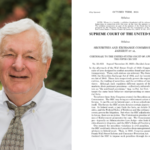
Inconclusive History
Supreme Court Affirms Lawlessness of the Removal of Kilmar Abrego Garcia
Previews for the 2024 October Term of the Supreme Court
United States v. Rahimi: Resisting the “Suicide Pact” For Now
SEC v. Jarkesy: Agencies Cannot Adjudicate Most Civil Penalty Disputes
Fischer v. United States: A Supposedly Textualist Court Ignores the Text
Loper Bright Enterprises v. Raimondo: Chevron is Dead; Long Live Skidmore
Recent Citations
United States v. Chatrie, No. 22-4489, 2025 WL 1242063, at *18 n.4 (4th Cir. Apr. 30, 2025) (en banc) (Wynn, J., concurring).
Tennessee v. Becerra, 131 F.4th 350, 365 (6th Cir. 2025).
Bondi v. VanDerStok, 145 S. Ct. 857, 894 n.5 (2025) (Thomas, J., dissenting).
Energy Michigan, Inc. v. Michigan Public Service Commission, 126 F.4th 476, 488 (6th Cir. 2025).
Carter v. United States, 145 S. Ct. 519, 542 (2025) (Thomas, J., dissenting from the denial of certiorari).
Alliance for Fair Board Recruitment v. SEC, 125 F.4th 159, 169 n.3 (5th Cir. 2024) (en banc).
Kentucky v. EPA, 123 F.4th 447, 478 (6th Cir. 2024) (Murphy, J., concurring).
United States v. Green, 114 F.4th 163, 173 (3d Cir. 2024).
Firearms Regulatory Accountability Coalition, Inc. v. Garland, 112 F.4th 507, 526 (8th Cir. 2024) (Shepherd, J., dissenting).
Consumers’ Research v. FCC, 109 F.4th 743, 765 (5th Cir. 2024) (en banc).
Abu v. Dickson, 107 F.4th 508, 515 (6th Cir. 2024).
Corner Post, Inc. v. Board of Governors of the Federal Reserve System, 603 U.S. 799, 830, 837 n.6, 838 (2024) (Kavanaugh, J., concurring).
Loper Bright Enterprises v. Raimondo, 603 U.S. 369, 405 n.7, 408 (2024).
Loper Bright Enterprises v. Raimondo, 603 U.S. 369, 433, 437 (2024) (Gorsuch, J., concurring).
Career Colleges and Schools of Texas v. Department of Education, 98 F.4th 220, 225 (5th Cir. 2024).






